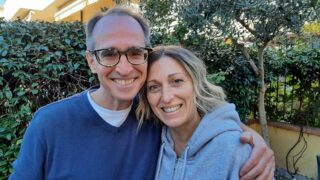In italiano: Sto imparando a vivere la mia malattia “sotto e oltre il sole” (blog post).
In Polish: Uczę się Żyć Swoją Chorobą „Pod i Ponad Słońcem”
Today is the one year anniversary of the “nasty diagnosis” my wife Silvia mentions in her article. We hope her thoughts on how she is dealing with her sickness provide you and those you love with encouragement. A pdf of Silvia’s article is found at the end, as well as the link to the original Italian version.
I am Learning to Live my Sickness “Under and Beyond the Sun”
Silvia Lagomarsino Ciavarella
Blaise Pascal wrote: “Let each one examine his thoughts, and he will find them all occupied with the past and the future. We scarcely ever think of the present; and if we think of it, it is only to take light from it to arrange the future. The present is never our end. The past and the present are our means; the future alone is our end. So we never live, but we hope to live; and, as we are always preparing to be happy, it is inevitable we should never be so” (Thoughts, 172).
We all put our hope of fulfillment and happiness into the future and plan it accordingly. What should we do next weekend? What will be our next work, church, or family project? This being so, a real threat to our future plans, even if they are not developed, is exceedingly destabilizing.
This threat came to me by a nasty diagnosis. One of those diagnoses that turns your life upside down and that, in the best scenario, will be long and quite painful.
For others, this threat might come through a major financial problem, a war, a crushing disappointment, or the loss of a loved one. Whatever the cause, that threat triggers a profound process of grief. A mourning that conceptually may seem difficult to reconcile with basic principles of the Christian faith–to be joyful always, cast our anxieties on Christ, follow him in every circumstance and, above all, think about his return and our eternal destiny after death.
My threat led me to reflect a great deal. In my reflections the Book of Ecclesiastes has been a great help. I have been a believer since I was a child, nevertheless I have not found many preachers who have prepared and taught through this book. I do remember that many years ago a study of the book was undertaken, at the request of a young man from our church youth group. The only thing I recall is how quickly the study was brought to the book’s conclusion: “Fear God and keep his commandments, for this is the whole duty of man” (Ecclesiastes 12:13).
Yet, in the first 12 chapters of the book, “Qohelet” (the “Teacher,” New International Version; or “Preacher,” English Standard Version) meditates on profound themes of daily life–themes that produce intense inner pain for those who think about them. And it seems that he is keen to emphasize that this pain cannot be ignored. This already emerges from the first two chapters where he highlights the vanity of everything that happens “under the sun”, that is, in our human existence on this earth.
Ecclesiastes points out the inexorability of the passage of time and its cycles that are all alike; the profound awareness of our mortality; and our inability to control events, despite our good intentions or having applied wisdom in our choices. The reflections on these issues lead the Teacher (1:18) to profound pain: “For with much wisdom comes much sorrow; the more knowledge, the more grief.”
Ecclesiastes is leading me to internalize three lessons.
1. I am learning to let myself mourn
It is not wrong to mourn about one’s defeats, human weaknesses, mortality and the fact that this life under the sun seems to make no sense. The Teacher spends nearly the entire book highlighting such failures. I believe that a key is found in discovering day by day how to weave this pain within our Christian journey, which nonetheless consists of joy, hope and peace in Jesus.
I feel that Ecclesiastes enables us to do this, and it is teaching me a second lesson.
2. I am learning to live, looking at God’s faithfulness both in the present and in the past (“under the sun”)
7:14 is the verse that played a decisive role in my understanding of Ecclesiastes: “When times are good, be happy; but when times are bad, consider this: God has made the one as well as the other. Therefore, no one can discover anything about their future.” Both the good and the bad things that happen to us are under God’s control. Indeed, they are created by him precisely so that we won’t have certainty that everything will go well. Both good and evil teach us to depend on God’s mercy day by day and to receive everything as a gift.
In this regard, in the Sermon on the Mount Jesus teachers us explicitly not to “worry about tomorrow [the future], for tomorrow will worry about itself. Each day has enough trouble of its own” (Matthew 6:34). This becomes easier when we reflect on God’s faithfulness as shown to us in the past. During my misadventure I meditated on the story of the prophet Samuel and the people of Israel. At one stage in their history, the Israelites had suffered two defeats against the Philistines, who were oppressing them, and had also lost the precious Ark of the Covenant. In these battles the Israelites had not trusted in the Lord but rather in their own strength.
Then, in his great mercy, God had the Ark brought back to his people and gave them a third chance to again trust in him and in him alone, and be freed from the oppression of the Philistines. While the prophet Samuel interceded for the people, God miraculously routed the Philistines who are defeated by Israel.
As a sign of recognition, Samuel set up a stone where this took place and “named it Ebenezer [literally, a stone of help], saying, ‘Thus far the Lord has helped us’” (1 Samuel 7:12).
At this juncture of my life this story has become very meaningful to me. In every challenge I’ve faced since my nasty diagnosis, when my mind starts to speed toward possible future scenarios, I try to take a second and repeat to myself: “Ebenezer, Silvia!” And then I pause and count the gifts, the blessings and how much the Lord has done in my life, as well as in the lives of those around me–even during this trial. “Thus far the Lord has helped us”, indeed!
3. I am learning to reset my hopes and projects in an eternal phase (“beyond the sun”)
Ecclesiastes 3:11 “He has made everything beautiful in its time. He has also set eternity in the human heart.”
Those who live in the awareness of the uncertainty of the future can’t help but appreciate the profundity of verses like James 4:15. It encourages us to plan our future, but to hold our plans very loosely knowing that our future is in God’s hands. The verse exhorts: “You ought to say, ‘If it is the Lord’s will, we will live and do this or that’.”
True hope concerns the eternal future, the fundamental concept of which is inherent in our nature: He has set eternity in the human heart (Ecclesiastes 3:11). And hhis lies beyond our uncertain earthly future.
In his First Letter, the apostle Peter says something specific about our certain future, calling it “an inheritance that can never perish.” This inheritance is ours because God has given us new birth, and it is certain because Jesus Christ rose from the dead. In 1 Peter 1:3-4 the apostle writes: “Praise be to the God and Father of our Lord Jesus Christ! In his great mercy he has given us new birth into a living hope through the resurrection of Jesus Christ from the dead, and into an inheritance that can never perish, spoil or fade. This inheritance is kept in heaven for you”.
Peter’s words were certainly encouraging for the first readers of this letter, but they should also be so for us. Faced with the fear and sadness tied to the uncertainties of the future, the awareness of being anchored to a living hope should indeed be of great encouragement to us—a hope living hope made possible by Jesus’s sacrifice and resurrection.
Can I deny that I experience sadness and fear in my journey of faith? I cannot! But I know that the one who has overcome death is my true Stone of help and has promised that he will not abandon us: “Surely I am with you always, to the very end of the age” (Matthew 28:20).
Silvia Lagomarsino Ciavarella is a Critical Care nurse and teaches the Bible to women at The Isolotto Reformed Church of Florence, Italy, where her husband Pietro Ciavarella is Lead Pastor. Pietro and Silvia have two adult sons.
PDF Silvia’s article: I am Learning to Live my Sickness “Under and Beyond the Sun”, Silvia Lagomarsino Ciavarella
This article first appeared in Italian on 3 August 2022 on the website of TGCi (The Gospel Coalition Italia) with the title: Sto imparando a vivere la mia malattia “sotto e oltre il sole” (blog post). The English version has been slightly modified. Biblical quotations are from either the New International Version or the English Standard Version.
–Sermons in English (which Pietro rarely preaches in). See also his podcast in English, “Blind in the Past“, which was begun a few days after we received the “nasty diagnosis”.
***
Seguimi su Facebook: Pietro Ciavarella
Puoi ascoltare il live-streaming del nostro sermone domenicale alla pagina Facebook Chiesa Evangelica Riformata l’Isolotto di Firenze dopo le ore 10,45.
Venite a trovarci 🙂 pciavarella12@gmail.com
–Podcast (italiano and English).
–Sermoni.
–Sermoni sul Vangelo di Marco.
–Sermoni su Giovanni Battista.
–Sermoni sulla Lettera di Paolo ai Romani.
–Sermoni sul sola Scriptura, soltanto la Bibbia.
–Sermoni sull’Avvento e sul Natale.
–Sermoni sulla Croce di Cristo.
–Sermoni della Quaresima e sulla Pasqua.
-Cos’è il Vangelo, prima parte; seconda parte.
–Corsi.
–Libri.
Se sei una donna, per te c’è anche lo studio biblico per le donne di mia moglie Silvia 🙂

